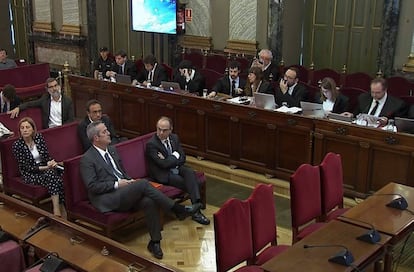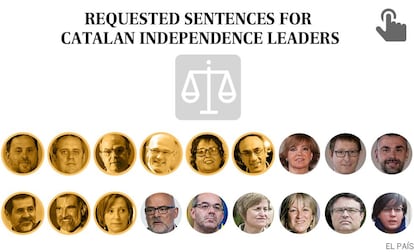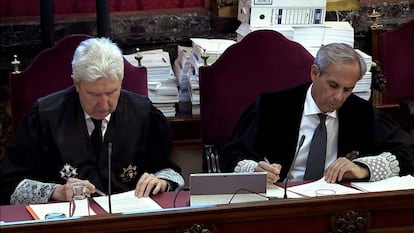Prosecutors uphold prison requests for Catalan separatist leaders
Oriol Junqueras faces 25 years in jail for his involvement in the 2017 secession drive after four months of hearings that did not alter the legal teams’ positions

The trial of Catalan secessionist leaders is coming to an end after nearly four months of proceedings at the Spanish Supreme Court, which heard over 400 witnesses and viewed hundreds of images from the fall of 2017, when the breakaway attempt took place.
Vox has dropped most of its accusations against ex-Catalan government official Santi Vila
After considering the evidence, neither the prosecution nor the defense teams have modified their positions in any significant way. On Wednesday, all sides delivered their final conclusions and largely ratified the views they’d held before the hearings began.
Public prosecutors continue to maintain that the accused promoted the execution of a strategy that was “perfectly planned, concerted and organized” in order to fracture Spain’s constitutional order with the aim of achieving Catalonia’s independence. Describing it as “patent insurrection,” they said this insurrectional period ranged from September 19 to October 27, 2017, when separatist parties made their unilateral independence declaration inside the Catalan parliament.

Up to 25 years
The public prosecution is upholding its request for a 25-year prison term against Oriol Junqueras, the former deputy premier of the Catalan government at the time of the breakaway attempt and leader of the Catalan Republican Left (ERC) party. He is charged with rebellion and misuse of public funds in connection with the illegal referendum of October 1, 2017 and the unilateral independence declaration of October 27.
Prosecutors also requested terms of seven to 17 years for the 11 other defendants. Joaquim Forn, Jordi Turull, Josep Rull, Raül Romeva and Dolors Bassa, who were members of the cabinet of ex-Catalan premier Carles Puigdemont and have been in preventive custody since late 2017, are facing 16-year terms.
Three other defendants who are also in preventive prison – former Catalan parliament speaker Carme Forcadell and the social activists Jordi Sànchez and Jordi Cuixart – are being accused of rebellion but not of misusing public funds. They face 17-year terms because prosecutors view them as leaders of the rebellion attempt.

Santi Vila, Meritxell Borràs and Carles Mundó, three additional defendants who were not placed in pre-trial confinement, face lower terms of seven years for misuse of public funds, as well as a €30,000 fine and a ban on holding public office for 20 months.
The public prosecution has also asked the court to apply section 36.2 of the Penal Code, which is used for particularly serious crimes and means that inmates may not be granted an open regime until they have served half their sentence. State prosecutors are trying to avoid a potential situation in which convicted leaders, who would probably serve their sentences in prisons run by the Catalan government, might be granted unusual benefits.
Two other accusers
The Solicitor General’s Office, representing the Spanish government, continues to accuse the defendants of sedition rather than rebellion, which carries lower terms of seven to 12 years. And the private prosecutor representing the far-right political party Vox is seeking prison terms of 24 to 74 years for rebellion, criminal association and misuse of public funds. Following the hearings, Vox has dropped most of its accusations against Santi Vila, a former Catalan cabinet member who resigned a day before the independence declaration, and will only seek to have him barred from public office.
English version by Susana Urra.
Tu suscripción se está usando en otro dispositivo
¿Quieres añadir otro usuario a tu suscripción?
Si continúas leyendo en este dispositivo, no se podrá leer en el otro.
FlechaTu suscripción se está usando en otro dispositivo y solo puedes acceder a EL PAÍS desde un dispositivo a la vez.
Si quieres compartir tu cuenta, cambia tu suscripción a la modalidad Premium, así podrás añadir otro usuario. Cada uno accederá con su propia cuenta de email, lo que os permitirá personalizar vuestra experiencia en EL PAÍS.
¿Tienes una suscripción de empresa? Accede aquí para contratar más cuentas.
En el caso de no saber quién está usando tu cuenta, te recomendamos cambiar tu contraseña aquí.
Si decides continuar compartiendo tu cuenta, este mensaje se mostrará en tu dispositivo y en el de la otra persona que está usando tu cuenta de forma indefinida, afectando a tu experiencia de lectura. Puedes consultar aquí los términos y condiciones de la suscripción digital.









































